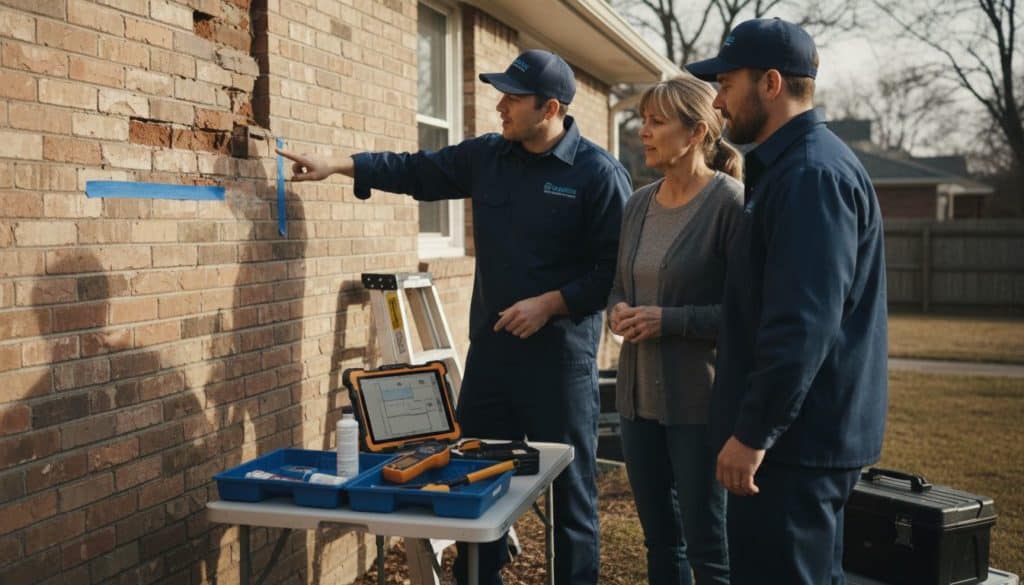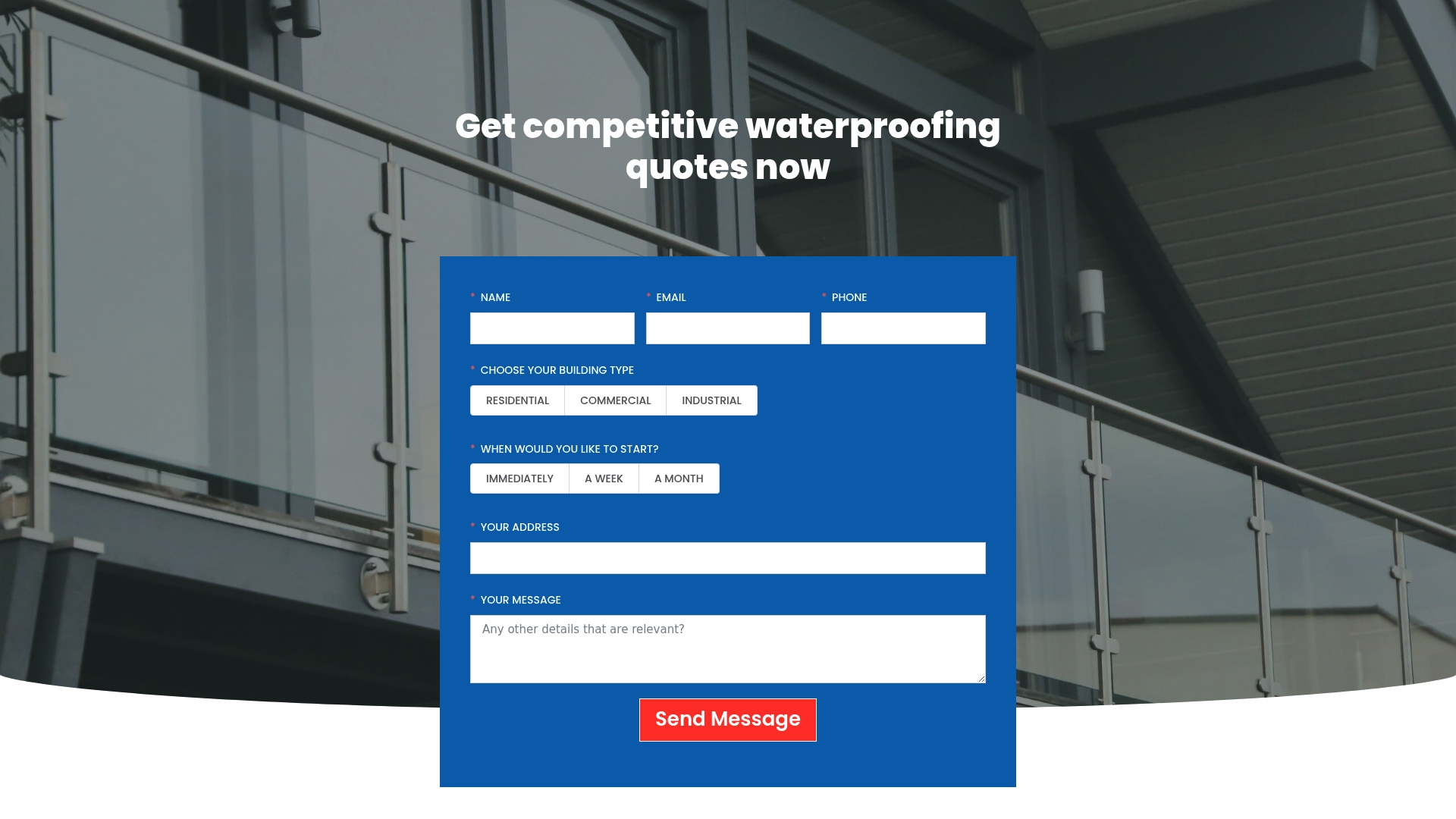Water damage repairs can cost homeowners more than R100,000 if left unchecked, yet many people only start looking for a reliable waterproofing contractor after serious problems appear. Choosing the right specialist from the start saves both money and stress by preventing ongoing leaks, mould, and costly structural damage. This guide breaks the process into simple steps so you can feel confident every stage, from assessing your project’s needs to securing strong guarantees.
Table of Contents
- Step 1: Assess Project Needs And Waterproofing Scope
- Step 2: Research And Shortlist Reputable Contractors
- Step 3: Evaluate Experience, Credentials, And Reviews
- Step 4: Request Detailed Quotes And Compare Offerings
- Step 5: Verify Guarantees, Insurance, And Workmanship Quality
Quick Summary
| Key Point | Explanation |
|---|---|
| 1. Clearly Define Project Needs | Assess your property’s waterproofing challenges and document findings to match with contractor expertise. |
| 2. Research Reputable Contractors | Compile a shortlist of licensed contractors and check their qualifications and past project experience. |
| 3. Compare Detailed Quotes | Request itemized quotes to evaluate costs fairly, ensuring all potential expenses are documented. |
| 4. Verify Guarantees and Insurance | Ensure contractors provide written warranties and valid insurance to protect your investment against risks. |
| 5. Contact References for Insights | Speak directly to previous clients to gauge a contractor’s reliability, work quality, and communication skills. |
Step 1: Assess project needs and waterproofing scope
Successfully selecting a waterproofing contractor starts with thoroughly understanding your specific project requirements and defining the precise waterproofing scope. This critical initial step ensures you match your unique needs with the right professional expertise.
According to the National Home Builders Registration Council, identifying remedial work contractors requires carefully evaluating the expertise needed for your specific project. Begin by conducting a comprehensive property assessment to pinpoint exact waterproofing challenges. Look for signs of moisture penetration such as water stains, mould growth, peeling paint, or structural dampness. Document these observations in detail to help potential contractors understand the full scope of work required.
The Gauteng Provincial Legislature recommends developing a comprehensive risk management plan that details key tasks and critical project milestones. This means breaking down your waterproofing needs into specific categories such as roof waterproofing, basement sealing, wall moisture protection, or external surface treatment. Each category requires unique skills and approaches.
Pro tip: Take high quality photographs of problem areas and measure the affected surfaces before meeting with contractors. This preparation helps professionals provide more accurate quotes and demonstrates your serious approach to resolving waterproofing challenges.
With your project needs clearly defined, you are now ready to move forward and research potential waterproofing contractors who can effectively address your specific requirements. Learn more about evaluating contractor credentials in our guide on how to choose a waterproofing contractor.
Step 2: Research and shortlist reputable contractors
Your next crucial step in selecting a waterproofing contractor involves thorough research and strategic shortlisting of professionals who can deliver reliable and high quality services. This process will help you identify the most competent contractors for your specific project needs.
According to the Waterproofing Trade Association of South Africa, professional associations can play a significant role in identifying reputable service providers. Start by compiling a list of licensed and registered waterproofing contractors. Check their membership with professional bodies, which often indicates adherence to industry standards and quality practices. Leverage online resources such as professional directories, contractor review websites, and industry specific platforms to gather initial recommendations.
Expand your research by examining each potential contractor comprehensive background. Request and verify credentials including business registration documents, insurance certificates, and professional qualifications. Review their portfolio of past projects especially those similar to your specific waterproofing requirements. Pay close attention to client testimonials references and look for contractors with demonstrable experience in addressing challenges comparable to your project scope.
Pro tip: Create a structured evaluation spreadsheet to compare potential contractors objectively. Include key assessment criteria such as years of experience specialisation areas past project references pricing transparency and professional certifications.
With your shortlist carefully compiled you are now prepared to move forward and initiate detailed discussions. Learn more about critical questions to ask waterproofing contractors in our comprehensive guide.
Step 3: Evaluate experience, credentials, and reviews
Evaluating potential waterproofing contractors requires a comprehensive assessment of their professional capabilities, track record, and reputation. This critical step helps ensure you select a contractor with the expertise and reliability needed to successfully complete your project.
When examining a contractor’s experience, look beyond simple years in business. Dive deep into their specific waterproofing specialisations and project history. Request detailed portfolios that showcase previous work similar to your project requirements. Pay close attention to the complexity of past projects, types of buildings they have worked on, and the range of waterproofing techniques they have successfully implemented.
Carefully scrutinise professional credentials by verifying essential documentation. This includes checking trade association memberships, professional certifications, insurance coverage, and valid business registration. Request copies of relevant licences and confirm their current status with appropriate regulatory bodies. Look for contractors who demonstrate ongoing professional development through additional training or specialised certifications in waterproofing technologies.
Pro tip: Do not rely solely on written testimonials. Request and contact references directly to gain genuine insights into a contractor’s work quality, reliability, and professional conduct. Ask specific questions about project completion timelines, communication effectiveness, problem solving skills, and overall satisfaction.
With a thorough evaluation of their experience and credentials complete, you are now ready to move forward to the next critical stage of contractor selection. Discover essential questions to ask during your final contractor interviews in our comprehensive guide.
Step 4: Request detailed quotes and compare offerings
The process of requesting and comparing waterproofing quotes is a critical step in ensuring you receive fair pricing and comprehensive service for your specific project needs. This stage requires strategic approach and careful analysis to make an informed decision.
According to ID Waterproofing, waterproofing costs can vary significantly, with torch-on applications typically ranging from R300 to R500 per square meter. When requesting quotes, insist on comprehensive documentation that breaks down all potential expenses. Each quote should include detailed line items covering materials, labour, equipment, surface preparation, specific waterproofing techniques to be used, projected timeline, and any potential additional costs.
From the foundation waterproofing cost data, we know project complexity can drive costs from R450 to R1,200 per square meter in Gauteng. This variation underscores the importance of obtaining multiple quotes to understand market rates. Create a comparative spreadsheet that allows side-by-side evaluation of each contractor’s proposal. Look beyond just the total price consider factors such as warranty offerings, proposed materials quality, estimated project duration, and professional approach.
Pro tip: Request itemised quotes that transparently display all potential costs. Beware of significantly lower quotes that might indicate substandard materials or potential hidden charges.
With a comprehensive comparison completed, you are now prepared to make an informed selection. Explore our guide on asking critical questions during final contractor interviews.
Step 5: Verify guarantees, insurance, and workmanship quality
Verifying the guarantees, insurance, and workmanship quality of your potential waterproofing contractor is the final critical step in ensuring a successful and reliable project. This comprehensive assessment protects your investment and provides peace of mind throughout the waterproofing process.
According to the Waterproofing Trade Association of South Africa, professional contractors must maintain robust business administration and financial resources that demonstrate their commitment to quality and contractual obligations. When verifying guarantees, request detailed documentation that clearly outlines warranty terms for materials and labour. Look for warranties that cover a minimum of 5 to 10 years, with specific provisions for different types of waterproofing failures.
Carefully examine the contractor’s insurance coverage, focusing on comprehensive liability and professional indemnity policies. Request copies of current insurance certificates and verify their validity with the issuing insurance provider. Pay special attention to coverage limits that adequately protect your property against potential damages or incomplete work. Additionally, request documentation proving workers compensation insurance to protect yourself from potential liability in case of workplace accidents during the project.
Pro tip: Do not accept verbal promises or generic warranty statements.
Insist on written documentation that explicitly details the scope of guarantees, including specific conditions, repair processes, and any limitations on coverage.
With thorough verification of guarantees and insurance complete, you are now prepared to make a confident final selection. Learn more about critical questions to ask during final contractor interviews in our comprehensive guide.
Ensure Your Waterproofing Project Succeeds with Trusted Expertise
Choosing the right waterproofing contractor can feel overwhelming when faced with numerous technical details and critical guarantees. This article highlights how important it is to assess project needs, verify experience, and demand clear warranties to avoid costly mistakes and ensure lasting protection for your property. Do not risk substandard workmanship or hidden costs when your home or business relies on reliable waterproofing.
Take control now by exploring expert advice and connecting directly with proven professionals at Pro Waterproofing. Our Uncategorized – Pro Waterproofing section guides you through critical questions, transparent pricing, and industry standards so you feel confident choosing your contractor. Visit our website today and make your waterproofing project safe, dependable and worry free.
Frequently Asked Questions
How can I assess my project needs before selecting a waterproofing contractor?
Start by conducting a comprehensive property assessment to identify specific waterproofing challenges such as moisture penetration or structural dampness. Document your observations and categorize your needs into specific areas like roof or basement waterproofing to prepare for contractor discussions.
What qualifications should I look for in a reliable waterproofing contractor?
Look for contractors with valid business registrations, insurance coverage, and memberships in professional associations. Ask for their portfolio to review past projects similar to yours and confirm their experience in the specific waterproofing techniques relevant to your requirements.
How do I compare quotes from different waterproofing contractors?
Request detailed, itemized quotes that break down all potential costs, including materials, labor, and specific techniques. Create a comparison spreadsheet to evaluate each contractor based on key factors like pricing, warranty offerings, and project timelines, ensuring a clear overview before making a decision.
What types of warranties should I expect from a waterproofing contractor?
Expect warranties covering both materials and labor, ideally lasting between 5 to 10 years. Ensure that the warranty documentation clearly outlines the scope of coverage, including conditions for different types of waterproofing failures.
How can I ensure the workmanship quality of a waterproofing contractor?
Verify the contractor’s previous work by checking references and contacting past clients about their experiences. Ask specific questions regarding project completion, communication, and overall satisfaction to assess the contractor’s reliability and quality of work.
What should I do if I notice issues after the waterproofing has been completed?
Contact your contractor immediately to discuss your concerns and check if the issues fall under the warranty coverage. Document the problems with photos and detailed descriptions to facilitate a smoother resolution process.




